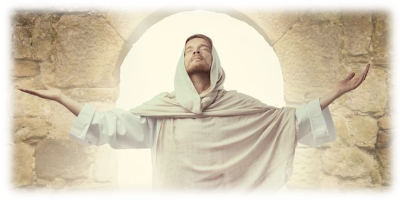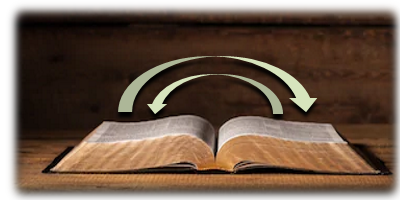The Hebrew word תורה (Torah, Strong's #8451) is usually translated into the English word "Law". Because of this translation there is a great misunderstanding of what Torah truly is. "TORAH IS NOT LAW". When we use the word "law" we assume a certain meaning and concept of the word that is not present in the Hebrew Scriptures.
Let us start by looking at the Etymology of the Hebrew word Torah so that we may better understand its true definition. The word Torah comes from the Hebrew root word ירה (Y.R.H, Strong's #3384), a verb which means "to flow or throw something". This can be a flowing of an arrow from an archers bow, or the flowing of a finger to point out a direction. Nouns are derived from the verb by making one or two changes to the verb root. When the letter י (yud) is replaced with the letter ו (vav) and the letter מ (mem) is added at the front of the word, the noun מורה (moreh, Strong's #4175) is formed. A moreh is "one who does the flowing". This can be an archer, who flows an arrow, or a teacher, who flows his finger to point out way the student is to go in the walk of life. Another noun is formed the same way except that a ת (tav) is placed at the front of the word instead of a mem, and we have the word Torah. Torah is "what is flowed by the Moreh". This can be the arrow from the archer or the teachings and instructions from the teacher.
A Hebraic definition of Torah is "a set of Instructions, from a father to his children, violation of these instructions are disciplined in order to foster obedience and train his children". Notice how the word Torah is translated in the New International Version translation in the following passages.
"Listen, my son, to your father's instruction and do not forsake your mother's teaching [Torah]." (Proverbs 1:8)
"My son, do not forget my teaching [Torah], but keep my commands in your heart". (Proverbs 3:1)
The purpose of a parents Torah is to teach and bring the children to maturity. If the Torah is violated out of disrespect or defiant disobedience, the child is punished. If the child desires to follow the instructions out of a loving obedience but falls short of the expectations, the child is commended for the effort and counseled on how to perform the instructions better the next time. Unlike Torah, law is a set of rules from a government and binding on a community. Violation of the rules require punishment. With this type of law, there is no room for teaching, either the law was broken with the penalty of punishment or it was not broken. God, as our heavenly Father, gives his children his Torah in the same manner;
"Blessed is the man you discipline, O LORD, the man you teach from your Torah" (Psalms 94:12)
THE TORAH IN THE NEW COVENANT
When God promised the New Covenant to Israel he said. "I will put my Torah in their minds, and write it on their hearts" (Jeremiah 31:33 and quoted in Hebrews 8:16). Here we see that God's plans in the new Covenant included his Torah. In the New Covenant, the word nomos (Greek translation of the Hebrew word Torah) is used about 200 times. Not one of these 200 occurrences ever says that the Torah has been abolished or taken away. Rather the New Covenant re-affirms the existence of the Torah. Here are just a few of these passages.
"It is easier for heaven and earth to disappear than for the least stroke of a pen to drop out of the Torah". (Luke 16:17)
But the man who looks intently into the perfect Torah that gives freedom, and continue to do this, not forgetting what he has heard, but doing it - he will be blessed in what he does. (James 1:25)
"Do not think that I (Yeshua) have come to abolish the Torah or the Prophets; I have not come to abolish them but to fulfill [live according to] them. I tell you the truth, until heaven and earth disappear, not the smallest letter, not the least stroke of a pen, will by any means disappear from the Torah until everything is accomplished". (Matthew 5:17,18)
They said to Rabbi Shaul: "You see, brother, how many thousands of Jews have believed, and all of them are zealous for the Torah". (Acts 21:20)
Many have the mistaken idea that Rabbi Shaul (Paul) taught against the Torah. There is no question that Rabbi Shaul, a devout Pharisee to the end, lived his life according to Torah. Let us examine some of Rabbi Shaul's statements regarding the Torah.
I believe everything that agrees with the Torah and that is written in the Prophets. (Acts 24:14)
I have done nothing wrong against the Torah of the Jews or against the temple or against Caesar. (Acts 25:8)
So then, the Torah is holy, and the commandment is holy, righteous and good. (Romans 7:12)
Do you not know, brothers - for I am speaking to men who know the Torah - that the Torah has authority over a man only as long as he lives? (Romans 7:1)
Do we, then, nullify [destroy, abolish] the Torah by this faith? Not at all! Rather, we uphold [stand on, establish] the Torah. (Romans 3:31)
For everything that was written in the past [The Torah and the Prophets] was written to teach us. (Romans 15:4)
There are passages in the New Covenant where Rabbi Shaul puts Torah in a negative light, but it must be understood that in Judaism there are two Torahs, The written, which is what we find in the first five books of the Bible, and the oral, which is the teachings of the Rabbi's that expound on the Torah and add many more commandments that are not found in the written Torah.
THE TORAH AS A WAY OF LIFE
The Torah is a way of life. From birth to death, God's Torah teaches his people how to live a holy life. The Torah covers such areas as; community, medicine, diet, health, clothing, housing, safety, morality, ceremonies, holy days, worship, relationships between family and neighbors and the list is practically endless. The Torah is not a book to be left on the shelf but a living word to guide, lead and direct the lives of God's people each day.
Like a lamp, the commands and Torah are a light and a way of life, correction and discipline. (Proverbs 6:23)
Blessed is the man who does not walk in the counsel of the wicked or stand in the way of sinners or sit in the seat of mockers. But his delight is in the Torah of the LORD, and on his Torah he meditates day and night. He is like a tree planted by streams of water, which yields its fruit in season and whose leaf does not wither. Whatever he does prospers. (Psalms 1:1-3)
The Psalmist describes the attitude that the man of God should have towards the Torah when he said "The Torah from your mouth is more precious to me than thousands of pieces of silver and gold" (119:72).
The Torah is not meant to be a drudgery of requirements, as the word law implies, but a joy and a delight to the people
THE TORAH OF LOVE
Love the LORD your God with all your heart and with all your soul and with all Your strength. These commandments that I give you today are to be upon your hearts. Impress them on your children. Talk about them when you sit at home and when you walk along the road, when you lie down and when you get up. (Deuteronomy 6:5-7)
And now, O Israel, what does the LORD your God ask of you but to fear the LORD your God, to walk in all his ways, to love him, to serve the LORD your God with all your heart and with all your soul. (Deuteronomy 10:12)
It was not God's intention to require his people to obey Torah out of fear and obligation, but rather out of love for him and his teachings. God desires that all his children place His Torah within their hearts and obey him as a child obeys his father, out of love and respect. King David explained his attitude toward Torah when he said;
"Oh, how I love your Torah! I meditate on it all day long" (Psalms 119:97).
Keep my commands and you will live; guard my Torah as the apple of your eye. Bind them on your fingers, write them on the tablet of your heart. (Proverbs 7:2-3)
If the Torah is not written on the heart, then the Torah is only an obligation, a set of rules that one must live by and are therefore a burden. But once the Torah is written on the heart, the person then keeps the Torah with love, joy and gladness.
I desire to do your will, O my God, your Torah is within my heart. (Psalms 40:8)
Teach me, O LORD, to follow your decrees; then I will keep them to the end. Give me understanding, and I will keep your Torah and obey it with all my heart. Direct me in the path of your commands, for there I find delight. (Psalms 119:33-35)
Even Rabbi Shaul had the same affection for the Torah that David did.
I delight in God's Torah... I myself in my mind am a slave to God's Torah. (Romans 7:22,25)
Love and Torah are inseparable. If one keeps and obeys the Torah, he is showing his love to God. If one loves God he will keep and obey His Torah. We can see this concept in many passages if we understand Hebrew parallelism. Hebrew parallelism is a form of Hebrew poetry which is saying the same thing in two or more different ways. As an example, let us look at Deuteronomy 11:1;
"Love the LORD your God and keep his requirements, decrees, laws and commands always."
When we read this as a Westerner of the 20th century, we see two completely different statements. The first is "Love the LORD your God" and the second is "keep his requirements, decrees, laws and commands always." These are not two different ideas, but rather the same thing. In the following passages are more examples of Hebrew Parallels (in bold) so that we can better understand what "Love the Lord" really means.
So if you faithfully obey the commands I am giving you today - to love the LORD your God and to serve him with all your heart and with all your soul, then I will send rain on your land in its season. (Deuteronomy 11:13)
If you carefully observe all these commands I am giving you to follow - to love the LORD your God, to walk in all his ways and to hold fast to him - then the LORD will drive out all these nations before you. (Deuteronomy 11:22)
For I command you today to love the LORD your God, to walk in his ways, and to keep his commands, decrees and laws; then you will live and increase, and the LORD your God will bless you in the land you are entering to possess. (Deuteronomy 30:16)
In our 20th century western culture, we usually view "love" as an emotion. From a Hebraic perspective, love is not an emotion, but rather an action. If I say that I "love" someone but never impart action into that relationship, there is no love. In the passages above we see action words like "keep, obey, walk, hold fast, and serve" being equated to the word "love".
Observance of Torah is not only the means by which we demonstrate our love to God, but it is also the means by which we demonstrate our love to our neighbor. Again, if I love my neighbor, I will act upon it. Many of the commands in the Torah deal with relationships between family, neighbors and foreigners.
Do not hate your brother in your heart. Rebuke your neighbor frankly so you will not share in his guilt. Do not seek revenge or bear a grudge against one of your people, but love your neighbor as yourself. I am the LORD. (Leviticus 19:17-18)
This connection between obedience to the Torah and love for God is carried over into the New Covenant as well.
"If you obey my commands, you will remain in my love". (John 15:10)
Let no debt remain outstanding, except the continuing debt to love one another, for he who loves his fellowman has fulfilled [lived according to] the Torah. The commandments, "Do not commit adultery," "Do not murder," "Do not steal," "Do not covet," and whatever other commandment there may be, are summed up in this one rule: "Love your neighbor as yourself." Love does no harm to its neighbor. Therefore love is the fulfillment of the Torah. (Romans 13:8-10)
We know that we have come to know him if we obey his commands. The man who says, "I know him," but does not do what he commands is a liar, and the truth is not in him. But if anyone obeys his word, God's love is truly made complete in him. This is how we know we are in him: Whoever claims to live in him must walk as Yeshua did. (1 John 2:3-6)
The last line in this passage said we "must walk as Yeshua did". Do we really know how Yeshua walked? Yeshua was a Jew who lived a strict life according to Torah, he walked that straight line perfectly and taught others to do the same. Those who claim to follow the steps of the Messiah, but do not walk according to the Torah are a liar as the last passage states.
"If you love me, you will obey what I command. ... Whoever has my commands and obeys them, he is the one who loves me... If anyone loves me, he will obey my teaching". (John 14:15,21,23)
Those who obey his commands live in him, and he in them. (1 John 3:24)
It has given me great joy to find some of you children walking in the truth, just as the Father commanded us. And now, dear lady, I am not writing you a new command but one we have had from the beginning. I ask that we love one another. And this is love: that we walk in obedience to his commands. As you have heard from the beginning, his command is that you walk in love. (2 John 4-6)
THE RIGHTEOUSNESS OF TORAH
The word "righteous" is a translation of the Hebrew verb צדק (Ts.D.Q, Strong's #6663), which means "to walk a straight line". From this root comes the noun צדיק (tsadiyq, Strong's #6662) which means "a straight line". This can literally mean a straight line, or figuratively "what is right" which is where we get the words "right" and "righteous". As discussed earlier, Torah is "a way of life" or "a way to walking". The Torah is a straight line and teaches God's children how to walk a straight line. Therefore, Torah is the "straight line" by which his children are to walk.
And what other nation is so great as to have such righteous (tsadiyq) decrees and laws as this body of Torah I am setting before you today? (Deuteronomy 4:8)
A tsadiyq is also "one who walks a straight line" or "a righteous one". Those who follow the righteous Torah are considered righteous, a tsadiyq.
And if we are careful to obey all this Torah before the LORD our God, as he has commanded us, that will be our righteousness (tsadiyq). (Deuteronomy 6:25)
You will again see the distinction between the righteous (tsadiyq) and the wicked, between those who serve God and those who do not. (Malachi 3:18)
The New Covenant also teaches that righteousness comes from obedience to the Torah.
For it is not those who hear the Torah who are righteous in God's sight, but it is those who obey the Torah who will be declared righteous. (Romans 2:13)
Dear children, do not let anyone lead you astray. He who does what is right is righteous. (1 John 3:7)
Like what you’re discovering? Continue the journey from Bible reader to translator.
|






